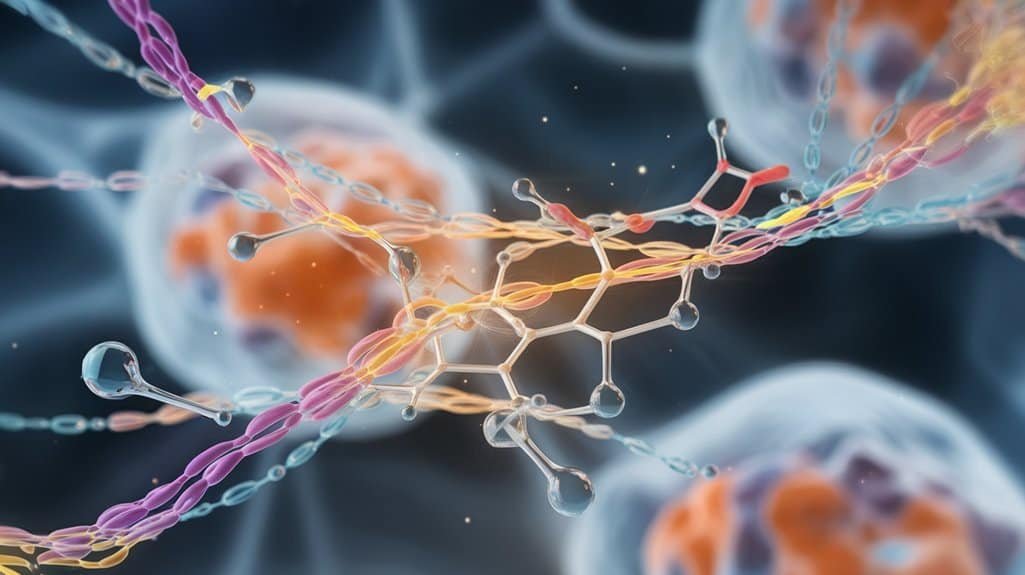Hormonal peptides are essential for metabolism as they orchestrate energy balance and nutrient utilization in your body. They include insulin, glucagon, and GLP-1, each playing distinct roles in regulating blood glucose and appetite. Insulin promotes glucose uptake, while glucagon raises blood glucose when needed. These peptides act through specific receptors, triggering second messenger cascades that amplify their effects. This intricate signaling maintains metabolic homeostasis, ensuring your body's energy needs are met efficiently. Understanding these mechanisms can deepen your insights into how hormonal peptides influence overall metabolic health. There's much more to explore regarding their impact and therapeutic potential.
Key Takeaways
- Hormonal peptides regulate blood glucose levels through insulin and glucagon, essential for maintaining energy balance.
- They influence appetite and satiety, with hormones like leptin and ghrelin modulating feeding behavior.
- Peptides like GLP-1 and GIP enhance insulin secretion post-meals, crucial for metabolic stability.
- They improve insulin sensitivity and lipid metabolism, with adiponectin playing a key role in addressing metabolic disorders.
- Hormonal peptides drive signal amplification in target cells, enhancing metabolic responses via second messenger cascades.
Overview of Peptide Hormones

Peptide hormones serve as critical regulators of various physiological processes, and understanding their structure and function is essential for grasping their impact on metabolism and overall health. These hormones consist of short chains of amino acids, making them distinct from protein hormones, which have longer chains. Being water-soluble, peptide hormones can't freely cross the plasma membrane, necessitating specific transport mechanisms for their biological action.
The synthesis of peptide hormones begins in the endocrine glands, where preprohormones undergo processing within the endoplasmic reticulum. This involves removing the N-terminal signal sequence and sometimes glycosylation. During this process, specific amino acid sequences are crucial for ensuring proper folding and function.
Once converted into prohormones, they're packaged into secretory vesicles and await exocytosis. Specific endopeptidases then cleave these prohormones, resulting in the mature hormones.
There are various types of peptides, including insulin, glucagon, and growth hormone, each playing unique roles in metabolic regulation and bodily functions. By influencing processes such as glucose regulation, stress response, and growth, peptide hormones are indispensable for maintaining homeostasis.
Understanding their synthesis and classification provides insights into their broader implications for health and disease management.
Mechanisms of Hormonal Action
Understanding how hormonal signals convey messages within the body reveals the intricate mechanisms through which peptide hormones exert their effects. When a peptide hormone binds to surface hormonal receptors on the plasma membrane of target cells, it initiates a cascade of biochemical events.
These receptors mainly consist of G-protein-coupled receptors (GPCRs), which activate a G-protein complex comprising alpha, beta, and gamma subunits. Upon activation, the G-protein can trigger various second messenger cascades, such as cAMP, cGMP, IP3, and DAG.
This process illustrates signal amplification, as a single hormone molecule can activate multiple second messengers, thereby efficiently transmitting the signal to effector proteins. For instance, cAMP activates protein kinases responsible for phosphorylating various proteins, leading to significant cellular responses, such as altered enzyme activity and changes in cell growth. Moreover, the action of these hormones is dependent on the existence of specific receptors for hormones, which ensures only target cells respond to their signals.
The regulation of second messengers, such as the rapid inactivation of cAMP by phosphodiesterase (PDE), guarantees that the hormonal signal remains transient. Consequently, understanding these mechanisms allows you to appreciate how peptide hormones intricately modulate metabolism through precise and potent signaling pathways.
Key Peptide Hormones in Metabolism

In the domain of metabolism, several key peptide hormones play essential roles in regulating energy balance and metabolic pathways. Insulin stands at the forefront, controlling blood glucose levels by promoting glucose uptake in cells and inhibiting hepatic glucose production. Its efficacy can diminish in conditions of insulin resistance, leading to metabolic dysregulation.
Conversely, glucagon serves to elevate blood glucose levels through glycogenolysis and gluconeogenesis, highlighting its critical glucagon function in energy mobilization.
Glucagon-like Peptide-1 (GLP-1) and Gastric Inhibitory Polypeptide (GIP) further refine this metabolic network. GLP-1 enhances insulin secretion and mitigates glucagon release, while GIP stimulates insulin release postprandially, markedly impacting energy homeostasis. Peptide hormones derived from the pancreas are crucial in this adaptive response to nutrient availability.
In insects, Adipokinetic Hormone (AKH) parallels glucagon by mobilizing lipids and carbohydrates, emphasizing the evolutionary conservation of these regulatory mechanisms.
Together, these peptide hormones orchestrate a sophisticated interplay between energy storage and mobilization, allowing you to maintain metabolic equilibrium in varying physiological states.
Understanding this intricate hormonal language is key to dissecting the underlying mechanisms of metabolism and addressing conditions linked to insulin resistance effectively.
Impact on Energy Regulation
Hormonal peptides orchestrate complex interactions that greatly influence energy regulation within the body. These peptides, such as leptin and ghrelin, play pivotal roles in maintaining hormonal balance by regulating appetite and metabolic pathways central to energy homeostasis. Leptin, produced by adipose tissue, signals satiety, while ghrelin, primarily produced in the stomach, stimulates hunger, especially in fasting states. This delicate interplay guarantees a responsive system to energy demands.
Furthermore, gut hormones—like GLP-1, PYY, and CCK—communicate with the central nervous system to modulate feeding behavior, enhancing the regulation of energy intake. These hormones not only influence appetite but also impact glucose and lipid metabolism, thereby directly affecting overall energy expenditure. For instance, adiponectin aids in lipid metabolism and may enhance insulin sensitivity, addressing metabolic disturbances.
Moreover, the integration of these hormones with other systems, including pancreatic function and liver metabolism, underscores their significance in energy regulation. By driving nutrient absorption processes and orchestrating energy expenditure, hormonal peptides guarantee robust metabolic pathways that respond to varying physiological states, ultimately maintaining your energy balance effectively.
Therapeutic Uses and Benefits

Many individuals seek therapeutic solutions to address hormonal imbalances and related health issues, taking advantage of advancements in hormonal peptide therapies. These therapies showcase promising therapeutic applications across various conditions.
For instance, growth hormone therapy effectively addresses deficiencies in children and adults, enhancing growth, bone density, and muscle mass. Similarly, insulin therapy is essential for managing type 1 and sometimes type 2 diabetes, sustaining blood glucose levels important for maintaining health.
Clinical outcomes associated with peptide-based treatments are remarkable. Testosterone and estrogen replacement therapies alleviate hormonal imbalances, addressing fatigue and weight gain in men while alleviating menopausal symptoms in women.
Additionally, peptides like Ipamorelin and Sermorelin support weight management by stimulating growth hormone release, leading to increased metabolism and lean muscle growth.
Peptides also demonstrate efficacy in specific medical conditions, such as acromegaly and neurodegenerative disorders, offering avenues for treatment that were previously limited.
Novel peptides could redefine obesity management by suppressing appetite and enhancing glucose tolerance. Ultimately, the diverse therapeutic uses and benefits of hormonal peptides underline their importance in optimizing metabolic health and addressing various physiological challenges.
Frequently Asked Questions
How Do Hormonal Peptides Differ From Steroid Hormones?
Hormonal peptides primarily function through cell surface receptors, initiating hormonal signaling without entering the cell, while steroid hormones penetrate cell membranes. This distinction influences their roles in metabolic regulation and physiological processes, emphasizing their structural differences.
Can Peptide Hormones Be Synthesized Artificially?
Did you know that over 95% of peptide production today relies on artificial synthesis methods? You can effectively synthesize peptide hormones through techniques like SPPS, NCL, and CFPS, enabling researchers to advance drug development and therapeutic applications.
What Role Do Peptide Hormones Play in Aging?
Peptide hormones counteract aging effects by enhancing tissue regeneration, improving muscle strength, and supporting metabolic balance. Their benefits include increased growth hormone levels, which mitigate sarcopenia and promote insulin sensitivity, essential for maintaining vitality throughout aging.
Are There Side Effects Associated With Peptide Hormone Therapies?
Imagine feeling vibrant, yet peptide therapies often bring unwanted side effects. You might face skin reactions, hormonal disruptions, and even cardiovascular strain, making it essential to weigh benefits against potential health risks before starting treatment.
How Do Lifestyle Factors Influence Peptide Hormone Levels?
Lifestyle factors, like dietary impact and exercise effects, greatly influence peptide hormone levels. A balanced diet with essential nutrients promotes hormone synthesis, while regular exercise enhances receptor sensitivity, optimizing hormonal response and metabolic regulation.
Conclusion
In the intricate dance of metabolism, hormonal peptides strut their stuff, managing energy balance with remarkable finesse. Ironically, while you might think that controlling weight requires sheer willpower, it's these tiny chains of amino acids that truly pull the strings. By understanding their roles and mechanisms, you're not just gaining insight into your body's workings but also discovering that the secrets to metabolic harmony might be beyond your control—yet somehow perfectly orchestrated by these unsung heroes of biology.




